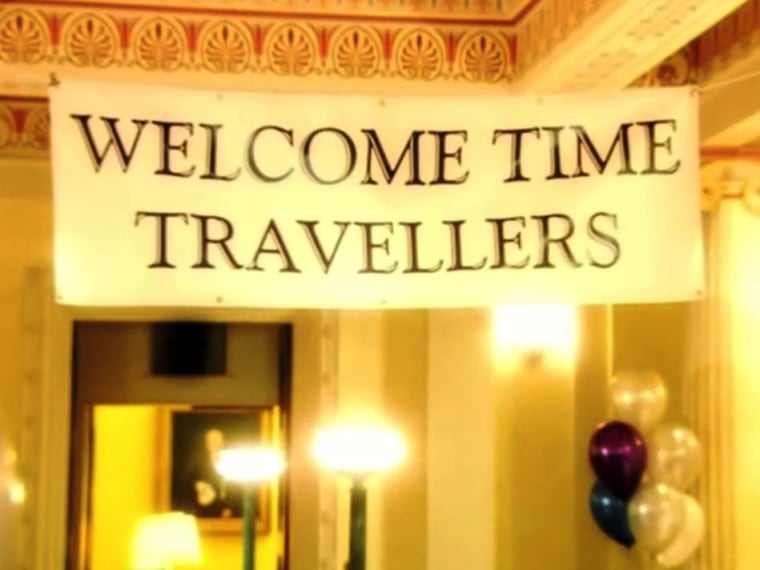Scientists have undertaken what they say is the most serious search for signs of time travelers at work on the Internet. They came up with no hard evidence — but does that rule out time travel completely?
"In my mind, it makes it less likely that it's possible," Robert Nemiroff, a physicist at Michigan Technological University, told NBC News.
However, he and MTU graduate student Teresa Wilson acknowledge there are lots of reasons why they might miss the hints of information flowing backward in time — ranging from a simple oversight to the influence of a cosmic Chronology Protection Agency.
Nemiroff and Wilson lay out their Internet-based experiment in a paper that's been submitted to the ArXiv scientific preprint server, as well as a poster to be presented next week at the American Astronomical Society's winter meeting in Washington.
An experiment 'just for fun'
Nemiroff said the idea of looking for time travelers arose during one of the poker games he organizes for his students at the university. "My summer students and I said, 'Why don't we start looking for this, just for fun?'"
The idea isn't a new one: For more than a century, science-fiction writers have been exploring the implications of going back and forth in time. In a sense, we're all traveling forward in time — and Einstein's theories of relativity showed that the rate of that forward travel can vary, depending on frames of reference. But backward time travel? Some physicists say that's impossible, due to the Second Law of Thermodynamics.
There have been a couple of attempts to lure time travelers to high-profile parties. MIT student Amal Dorai tried that in 2005. Famed British physicist Stephen Hawking issued post-dated invitations to a party in 2009. Nobody came.
The comet and the pope
Nemiroff and Wilson tried a different tactic. They looked for signs of foreknowledge about specific events on the Internet, or in Twitter tweets. The two events they chose were the discovery of Comet ISON in September 2012, and the selection of Pope Francis in March 2013. Looking for the evidence was trickier than it might sound: For example, search engines such as Google and Bing can misinterpret time stamps for Web pages, and it's also possible to back-date blog entries or Facebook posts.
The researchers found Twitter searches to be the most reliable tools, because tweets can't be back-dated. "No clearly prescient content involving 'Comet ISON,' '#cometison,' 'Pope Francis' or "#popefrancis' was found from any Twitter tweet — ever," they reported.
They also issued a request for time travelers to send tweets using either the hashtag "#ICanChangeThePast2" or "#ICannotChangeThePast2" by the end of August 2013. The trick was that the request was issued in September. No such tweets were found that predated the deadline. (Some have been received since, however, including this one from Thursday: "Your future laws forbid me from giving you any proof of our technologies. But be sure that we're watching you. #ICanChangeThePast2")
Nemiroff told NBC News that the time-travel paper was submitted to three journals, but was rejected by all three. "At this point, I don't know if it will ever appear in a refereed journal," he said. If there are any time travelers out there who can let him know, he'd appreciate hearing about it. And while you're at it, he'd also appreciate receiving "a large sum of money in negotiable currency."
More about time travel:
- Stephen Hawking: Time travel may be possible, if ...
- Have wormhole, will travel — maybe back in time
- Time-twisting test stuck in limbo | Latest update
Alan Boyle is NBCNews.com's science editor. Connect with the Cosmic Log community by "liking" the NBC News Science Facebook page, following @b0yle on Twitter and adding +Alan Boyle to your Google+ circles. You can also check out "The Case for Pluto," my book about the controversial dwarf planet and the search for new worlds.
